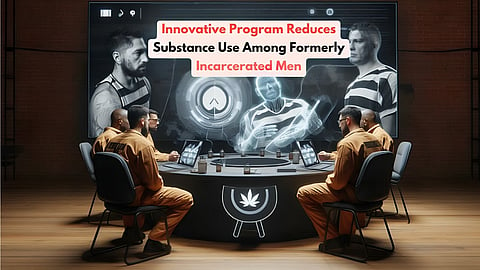Innovative Program Reduces Substance Use Disorder Among Formerly Incarcerated Men
A new study from the University of Illinois Urbana-Champaign, led by Liliane Cambraia Windsor, shows that combining critical dialogue (CD) and capacity-building projects (CBP) significantly reduces alcohol and substance use among formerly incarcerated men. Tested in a clinical trial with 602 participants, this program offers hope for communities with high substance use rates.
The study found that peer-delivered CD and CBP sessions effectively reduce substance use and emphasized the importance of addressing social determinants of health (SDOH) using critical consciousness (CC) theory. Results showed that these sessions, facilitated by trained peer facilitators (TPFs), empowered participants in their recovery and community improvement.
Future plans include improving session attendance, testing the intervention in broader settings, and researching community-level outcomes. This intervention, costing about $138 per person, is a cost-effective, scalable solution, highlighting the need to address systemic issues like racism, classism, and sexism in substance use disorder treatment. The research, a collaborative effort between community members and scientists, demonstrates the power of combining scientific rigor with community-based participatory research.
Key Findings
The study, conducted with 602 men with histories of substance use disorders (SUD) and incarceration, aimed to identify effective intervention components that reduce substance use. Researchers found that peer-delivered critical dialogue (CD) and capacity-building projects (CBP) were effective in reducing substance use when participants attended the sessions consistently.
Rationale for Testing Community Wise for Men with Histories of Incarceration and SUD
In the United States, most formerly incarcerated people are men. They often return to predominantly Black and historically marginalized communities that lack government and private investment. This neglect results in poor social services, high poverty, crime, and unemployment rates. The combined effects of racism, classism, and stereotypes of masculinity lead to greater socioeconomic and health needs, including disease prevention, health care, housing, and jobs.
Addressing Social Determinants of Health
Most interventions for substance use disorders (SUD) focus only on changing individual behavior, despite evidence that reducing health inequities requires addressing social determinants of health (SDOH). This study used critical consciousness (CC) theory, encouraging reflection on social, political, and economic conditions and promoting civic engagement. This approach has been shown to improve various health outcomes related to SDOH.
Study Design and Analysis
This study aimed to create an effective program to reduce alcohol and substance use (ASU) among men with histories of SUD and incarceration. Researchers used a 24 full factorial experiment to evaluate the effects of four intervention components on ASU reduction. Low attendance in the 15 sessions of Community Wise led to an intent-to-treat (ITT) analysis that didn't fully meet initial criteria. A modified ITT analysis was done to account for attendance, supporting the inclusion of critical dialogue (CD) and capacity-building projects (CBP) as effective components. It also identified trained peer facilitators (TPFs) as efficient and effective leaders.
The Intervention
Participants were assigned to different groups receiving combinations of:
Critical Dialogue (CD): Six weekly two-hour group sessions discussing societal and personal issues.
Quality of Life Wheel (QLW): Six weekly one-hour group sessions focusing on improving life satisfaction.
Capacity Building Projects (CBP): Six weekly one-hour group sessions working on community projects.
Facilitators: Sessions led by either trained peers or licensed professionals.
Results
The study found that peer-delivered CD and CBP sessions significantly reduced substance use over five months. This approach provided support and empowered participants in their recovery and community improvement. CD combined with CBP, delivered by trained peer facilitators (TPFs), is the optimized Community Wise format for future research.
Future Directions
Researchers plan to:
Improve session attendance rates.
Test the optimized intervention against standard treatment in broader community settings.
Develop strategies for effective implementation in various populations.
Research community-level outcomes like community cohesion and successful project completion.
Investigate the impacts of facilitator type and demographic characteristics on ASU.
Conclusion
This study shows the importance of community involvement and peer support in addressing substance use disorders. The intervention, costing about $138 per person, is a cost-effective, scalable solution with substantial impact potential. It highlights the need to address systemic issues like racism, classism, and sexism in SUD treatment.
About the Study
The research was a collaboration between community members and scientists, ensuring the intervention was culturally relevant and community-driven. The study's success demonstrates the power of combining scientific rigor with community-based participatory research principles.
Reference-
Windsor, L. C., Benoit, E., Lee, C., Jemal, A., Kugler, K., Smith, D. C., Musaad, S. (2024). Critical Dialogue and Capacity-Building Projects Reduced Alcohol and Substance Use in a Randomized Clinical Trial Among Formerly Incarcerated Men. Substance Use & Misuse, 1–12. https://doi.org/10.1080/10826084.2024.2352611
(Newswise/SKS)


